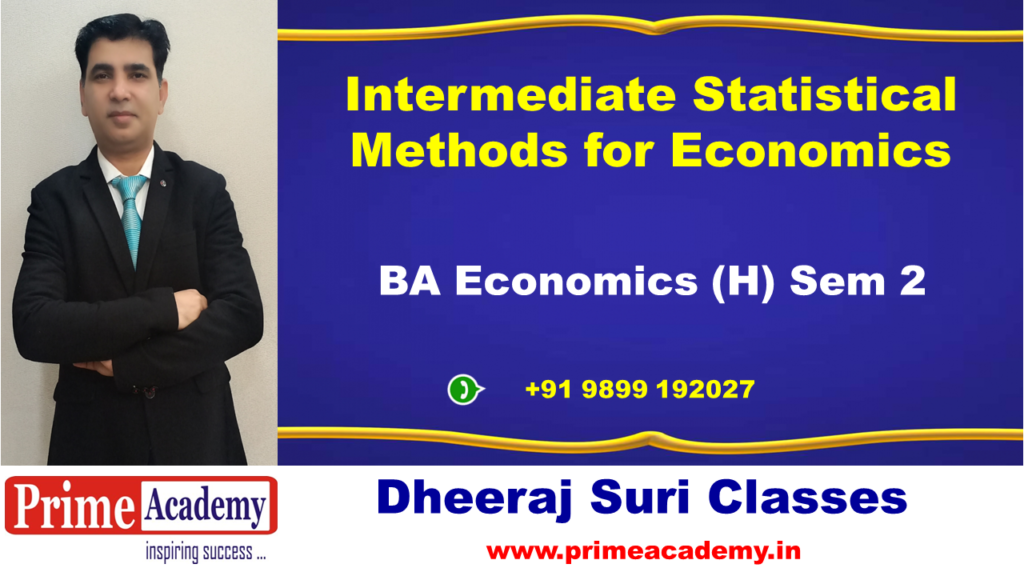Welcome to Prime Academy
We provide Best Online Coaching for Intermediate Statistics for Economics [ECON 006] for Economics (H) Semester II, University of Delhi
For getting access of recorded video lectures of
Intermediate Statistics for Economics for Economics (H) Semester II, University of Delhi
you need to subscribe our course.
If you are not registered at our website then Register Here
(After registration please inform us at +91 9899 192027 to get the access)
If you are already registered and have Got the access then Login to watch the Lectures
Semester 2 Subjects
►Intermediate Mathematical Methods for Economics
►Intermediate Statistics for Economics
►GE Introductory Probability
Reading List of Intermediate Statistics for Economics
The Intermediate Statistics for Economics Course for BA (Hons) Economics Semester II, Delhi University has been taught by Mr. Dheeraj Suri. The Video Lectures are based upon the books prescribed by the University of Delhi. The Duration of Video Lectures is approximately 50 Hours.
Access of Video Lectures is provided on any one of the following devices:
Windows Computer or Laptop, or
Android Phone or Tablet, or
Apple Iphone or Ipad, or
Apple Macbook,
till end of Semester II Exams.
Course Fee : Rs. 7000
Fee Structure :
| Single Device | Two Devices | |
|---|---|---|
| Single Subject | Rs. 7000 | Rs. 12,000 |
| Two Subjects | Rs. 13,500 | Rs. 23,000 |
| Three Subjects | Rs. 20,000 | Rs. 33,000 |
| Four Subjects | Rs. 26,000 | Rs. 42,000 |
Once You get the access you need to login and download our APP and all the lectures from your login account and play in your device.
You will get :
►Full Course Video Lectures
►Complete Study Material (PDF Notes) which includes Concepts, Previous Year Questions, Numerical Questions, MCQ’s and Important Questions
►Live Online Doubts Sessions with Expert Faculty (at least twice a week) for resolution of Doubts
►Online Discussion Forum to Post Your Queries to Discuss with Faculty & other fellow Students
►Mock Tests at the Website for regular assessment and progress tracking
►Video Lectures Cover Theory Portions Exhaustively + Complete Solutions of Back Questions of Readings + Solutions of Previous Years Papers + Large Number of Numericals
►Comprehensive Coverage of Syllabus and Exam Oriented Preperation
This online coaching platform aims to provide a supportive and engaging learning environment for students to achieve academic success and excel in their Economics Honours program.
Demo PDF Notes
Click here for Demo PDF of Study Material
For Complete PDF Notes of Intermediate Statistics for Economics
Contact us at +91 9899192027
Demo Quiz
For Complete Mock Test Series of Intermediate Statistics for Economics, You need to subscribe our course.
Contact us at +91 9899192027
Demo Lectures
Exam Pattern
The Question Paper will be of 90 Marks
Suggested weightage for each unit in the final examination
Unit I : 20 marks
Unit II : 30 marks
Unit III + Unit IV : 40 marks
Paper Pattern
►All questions in Units 1 and 2 would be compulsory. There would be two questions in each of these units.
►Units 3 and 4 would together have 3 questions, of which students would be
required to do 2 questions.
►There would be a limited number of sub-parts per question. No sub-part would be less than 5 marks and if a sub-part had more than 5 marks, the marks would be in multiples of 5.
Essential Reading :
►Devore, J. (2012). Probability and statistics for engineers, 8th ed. Cengage Learning.
Supplementary Reading :
►Hogg, R., Tanis, E., Zimmerman, D. (2021) Probability and Statistical inference, 10TH Edition, Pearson
►Larsen, R., Marx, M. (2011). An introduction to mathematical statistics and its applications. Prentice Hall.
►Miller, I., Miller, M. (2017). J. Freund’s mathematical statistics with applications, 8th ed. Pearson.
►Anderson, D. R, Sweeny, D. J, et. al (2019), Statistics for Business and Economics, 13th edition, Cengage Learning.
►Jan Kmenta (1997), Elements of Econometrics, 2nd ed. Macmillan publishing; New York and Collier Macmillan; London.
On Payment of Fee we will create your account on our website & you need to login and download all the lectures & our APP through that login account
Payment Details
To purchase any course you need to transfer the amount either through Google Pay or PhonePe at 9811261671 or Paytm at 9899192027 or Transfer through net banking IMPS into the following account
Account Details
Dheeraj Suri
Saving Account Number
392010100053871
Axis Bank, Model Town Branch
Delhi – 110009
IFS Code : UTIB0000392
Payment App Details
GPay Number : +91 9811261671
PhonePe Number : +91 9811261671
Paytm Number : 9899192027
After transfer update us with payment details through Whatsapp at +91 9899192027
Course Content of Our Video Lectures
Lectures are as per Latest Syllabus for 2025 UGCF
Unit 1 : Sampling Distribution of a Statistic
Chapter 1 : Sampling
Duration of Lectures : 443 Minutes
Based Upon J L Devore Chapter 5 (Section 5.3, 5.4 & 5.5)
Topics Covered
►Sampling
►Statistics & Their Distributions, Statistic & Parameter
►The Distribution of the Sample Mean, Sampling Distributions
►Central Limit Theorem
►The Distribution of a Linear Combination
►Questions from Recent Eco (H) Examinations
►Back Questions of Readings
Unit 2 : Estimation
Chapter 2 : Point Estimation
Duration of Lectures : 307 Minutes
Based Upon J L Devore Chapter 6;
Topics Covered
►Point Estimate
►Minimum Variance Unbiased Estimator
►Standard Error of Estimator
►Maximum Likelihood Estimator
►Method of Moments
►Properties of Estimators
►Questions from Recent Eco (H) Examinations
►Back Questions of Readings
Chapter 3 : Confidence Interval
Duration of Lectures : 230 Minutes
Based Upon J L Devore Chapter 7;
Topics Covered
►Properties of a Confidence Interval
►Confidence Interval of a Single Mean for Large & Small Samples
►Confidence Interval of Proportion
►Confidence Interval of Variance
►Chi-Square and F Distribution
►Questions from Recent Eco (H) Examinations
►Back Questions of Readings
Unit 3 : Inference
Chapter 4 : Inference
Duration of Lectures : 120 Minutes
Based Upon J L Devore Chapter 8.1;
Topics Covered
►Meaning of Statistical Hypothesis
►Errors in Hypothesis Testing
►Type 1 & Type 2 Errors
►Power of a Test
►Questions from Recent Eco (H) Examinations
►Back Questions of Readings
Unit 4 : Hypothesis Testing
Chapter 5 : Hypothesis Testing
Duration of Lectures : 240 Minutes
Based Upon J L Devore Chapter 8.2 – 8.5;
Topics Covered
►Testing of a Population Mean for Large Samples
►Testing of a Population Mean for Small Samples
►Testing of a Population Proportion for Large Samples
►Testing of a Population Proportion for Small Samples
►Hypothesis Testing for Variance
►Questions from Recent Eco (H) Examinations
►Back Questions of Readings
Chapter 6 : Two Sample Tests
Duration of Lectures : 270 Minutes
Based Upon J L Devore Chapter 9
Topics Covered
►Testing Equality of Means for Two Large Samples
►Testing of Equality of Means for Two Small Samples
►Testing for Ratio of Variances
►Questions from Recent Eco (H) Examinations
►Back Questions of Readings














